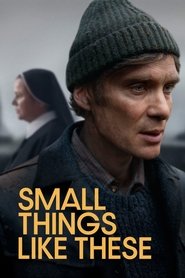The film itself feels conflicted about how much to trust the viewer to get its message. Just to take two examples from the film, the boy collecting sticks in the minutes "for his dog" is an obvious lie, yet the screenplay doesn't insist on this being picked up. Similarly, Bill's actual parentage seems signposted towards his 'uncle', yet the film doesn't overplay its hand to make this point. Then, on the other hand, it seems to double-down on the threats made towards Bill, with the screenplay making them more than a little too explicit when placed against some of the other subtleties. The flashbacks of his childhood are equally unsubtle, yet also too lightweight and, in the end, possibly superfluous to the plot and for the Bill's moral calculus. Wouldn't it be more of a testament to Bill's character if he wasn't relentless bullied as a child, yet he still had enough humanity to help another person in so clearly in need?
Indeed, despite Bill's metaphorically dirty hands, his story is a little too neat and clean. I left the film wondering why I felt this way, when the book did not leave me with that impression at all. Rather, Claire Keegan's book left me with a distinct sadness for those who lived in Ireland during the 20th-century. I wonder if it's because the disarming power of stories such as The Ones Who Walk Away from Omelas or The Lottery is that they implicate everyone in the town, and in the Keegan's novella, this aspect worked better because the taciturn Bill became something of faceless avatar moving through a world described by the narrator, rather than a 100% real person. I don't mean to suggest that he "didn't actually exist" in the book and was some kind of ghost, but that he becomes much more of a surrogate of the narrator's description of the world. I think this is why there were so many over-the-shoulder shots of Murphy throughout the film: attempts to minimise his corporeality and narrative weight in the more-visual medium of cinema. Does it work? Mostly.
Part of the film’s shocking power lies in the way it demonstrates the role women play in upholding society’s punishing patriarchal standards. Bill lives in a woman-dominated world, barely interacting with any men, yet it’s these women — from the nuns themselves, to Eileen, to a pub landlady — who repeatedly warn him of the potential costs of interfering with something that is “none of our business.”[…]
[A] political allegory disguised as a character study, a reflection on national guilt and moral complicity, wrapped inside the experiences of one man, in one small town, standing in for the whole of Ireland, and possibly the world. Given the current context — particularly the furious ongoing debate about institutional silence in the face of ongoing atrocities in Gaza — the questions the film raises about the moral implications of speaking out feel as live as ever.
— Rachel Pronger (IndieWire)
Though the film takes place at Christmas, the obvious Virgin Birth and Nativity story parallels are never underlined, with the setting more designed to highlight the secular hypocrisy of a cheerful town participating in a season of goodwill and letters to Santa (who also uses coal as a punishment) right outside those cold convent walls.
— Jessica Kiang (Sight and Sound, November 2024)

